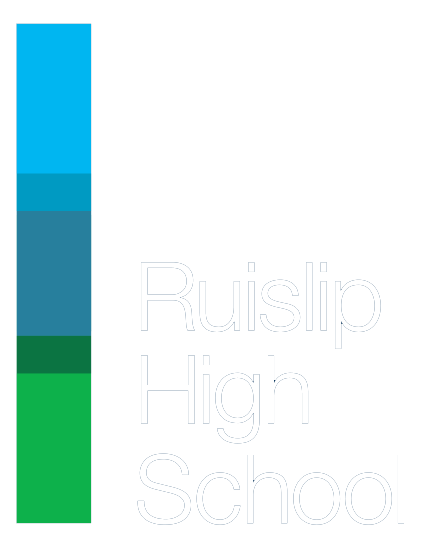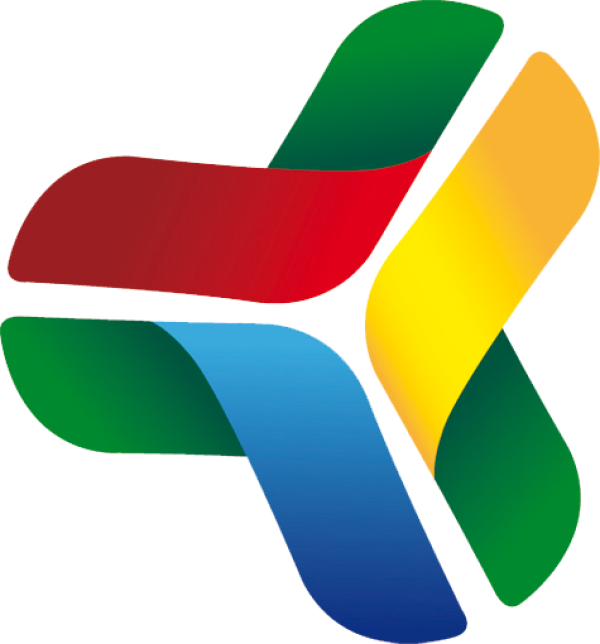Drama
To study performing is to study all human communication at once, and through Drama at Ruislip High School we further our students’ ability to express themselves as communicators. Students learn about a wide variety of cultures and periods of history, and how the context of those people, places and events changed the way people expressed themselves and the way people told stories - because it helps us understand the way we do that ourselves. No matter one’s job, effective communication, confidence and the ability to make yourself known through more than mere explicit instruction are vital - and these are the serendipitous byproducts of our Drama curriculum.
Key Stage 3
The three main goals of Drama at Key Stage 3 are for students to be able to practically perform and present to an audience, be able to plan and understand what makes a performance effective, and to evaluate the success of performance. These three goals underpin a journey that starts in studying the history of theatre in Year 7 and ends with researching, writing, designing and performing an entirely original piece at the end of Year 9. By the end of KS3, students are not only prepared for GCSE Drama, but those students who are not taking the subject will have a clear and powerful set of practical and evaluative tools that will help them with any form of public communication on whatever path they follow.
Year 7
- The History of Theatre: This unit covers important moments in the history of theatre and allows students a chance to experience some of the techniques that were developed in those moments.
- Mime / Introduction to Physical Skills: This unit focuses on physical choices such as gait, gesture, posture, rhythm, eye line, eye contact, through looking at traditional and modern mime skills.
- Mask / Neutral Mask: This unit builds on the physical choices learned in the previous unit by beginning to apply them to specific stories and narratives, whilst building character based around a mask.
- A Midsummer Night's Dream: Students learn about the play, looking at how to communicate the character and tell the story, and begin to look at Shakespearean language.
- Speaking Poetry / Introduction to Vocal Skills: Poems are used as a way of exploring how we can use our vocal choices to create an emotional response in an audience. Students are introduced to accent, pitch, rhythm, pace and tone.
- Wind in the Willows: Students study a text, observe professional performance of character and perform a scene, writing an evaluative paragraph of their peers’ work.
Year 8
- Aspects of Production Design: Students learn about lighting, sound, costume, set, staging and production design.
- Adaptation; From Page to the Stage: Students study a variety of dramatic adaptations, looking at successful and unsuccessful examples, eventually beginning to work on their own.
- Greek Theatre / Antigone: Students look at the key components of Greek Theatre through the story of ‘Antigone’.
- Commedia Dell’Arte: This unit focuses on the traditional ‘lazzi’, and the archetypal characters found in Commedia. There is an introduction to the fundamentals of comedy and audience interaction.
- Jacobean Theatre: Students look at the natural progression from Commedia to Jacobean performance style, and look at how Jacobean plays have been adapted and transposed throughout history.
- Verbatim Theatre and True Stories: This unit introduces the idea of verbatim theatre and the adaptation of historical and significant events into performances.
Year 9
- ‘What makes a good play?’: Students draw on knowledge from Y8 to look at how all aspects of a performance come together. How does the lighting change an actor’s decisions? How does the costume help the director?
- Physical Theatre: Students are introduced to the genre of physical theatre with a focus on the work of Frantic Assembly.
- Brecht, Epic and Allegorical Theatre: This unit explores the impact of Brecht’s theory and writings on modern theatre, and the different devices used in allegorical theatre.
- Naturalism: Students explore Stanislavskian techniques and characterisation through the work of American writers like Mamet and Miller, and also compare the text to Chekhov.
- Unheard Voices: Students look at using techniques explored in Spring Term 1 and 2 to bring to life a diverse range of voices and stories through a variety of stimuli, in a group setting.
- Devising and Dramaturgy: Students draw together all aspects of a performance to create their own devised piece, using the full sound and lighting equipment in the theatre.
Key Stage 4
GCSE Drama - Exam Board: AQA
Our curriculum at GCSE aims to encourage students to become confident performers, designers, directors and writers. The skills developed during this time will help them if they choose to further pursue Drama at A Level but, whatever option they choose, students will gather many invaluable skills, both theatrical and transferable, to expand their horizons in their chosen field. All students will have the opportunity to devise drama, explore texts practically, and work on two text-based performances. We feel this to be important to enable GCSE students to gain a breadth of knowledge about the subject but also to expand their creativity when devising and also develop their cultural capital. As well as preparing students for their exams, we aim to inspire curiosity, passion and a love for the art form which is why we choose texts which differ in styles.
Component 1: Understanding of Drama (Written Exam 1hr 45 mins) Students answer three sections of questions on theatre roles and terminology, study of set text and live theatre response.
Section A: Multiple choice theatre roles and terminology (4 marks)
Section B: Four questions on a given extract from the set play that you study. (44 marks)
Section C: One question (from a choice) on the work of the theatre makers in a single live theatre production (32 marks)
Component 2: Devising Drama (Practical) Students create, develop and perform a devised piece from stimulus material provided by the teacher. The devised piece must be performed using a specific genre. Students must choose one specialism, performer or designer. The devising log is each student's individual record of their contribution to the group process, it is an analysis and evaluation of the work created.
Component 3: Texts in Practice (Practical) Performance of two extracts from one play. Students may contribute as a performer or designer.
How will I be assessed?
Component 1: Understanding of Drama. Open Book Written Exam 1hr 45 mins 80 Marks in total. 40% of GCSE
Component 2: Devising Drama. Devising log – Process/Evaluation. 2,500 words if entirely written. Devising log can contain photographs and sketches. (60 marks) Devised performance – Performance/designer (20 marks) 80 Marks in total. 40% of GCSE
Component 3: Texts in Practice. Performance of extract 1 (20 marks) Performance of extract 2 (20 marks) 40 Marks in total. 20% of GCSE
Extra-Curricular Opportunities
In Year 10 and 11 students attend regular theatre trips. Students will also get the opportunity to assist, act and direct in regular school productions.
Future Careers
Teacher/Lecturer, Actor, Director and Script Writer, Broadcast Presenter, Advertising, Marketing and PR, Writer, Screenwriter, Playwright, Journalism & Law
Key Stage 5
A Level Drama and Theatre - Exam Board: AQA
Students will have the opportunity to create, perform and respond to drama and theatre. They will develop their creativity and independence to become effective theatre makers. Students will analytically explore a range of diverse classical and contemporary plays and performance styles from the perspectives of an actor, director and designer. The course aims to furnish students not only with a wide range of practical skills, but also with the academic understanding to support them. This course offers a spectrum of skills which are highly transferable to many career paths.
Assessment:
Component 1: Drama and Theatre Drama and Theatre Students study two set texts (Yerma by Federico García Lorca and The Caucasian Chalk Circle by Bertolt Brecht) and develop knowledge and understanding of making, performing, interpreting and understanding drama and theatre. Students will learn how to analyse and evaluate the work of live theatre makers (performers/ designers/directors).
Questions that will be covered include: How do the theatrical processes and practices involved in interpreting and performing theatre impact performance? How is meaning created using conventions, forms and techniques in drama and live theatre? Do creative and artistic choices influence how meaning is communicated to an audience?
Component 2: Creating Original Drama (Practical) Students will create a group performance/design realisation of one key extract from two different play texts which contrast in style and genre.
Questions that will be covered include: How do acting styles contrast and change depending on genre? Why are the key scenes so important in each play text?
Component 3: Making Theatre (Practical) Practical performance exam. Students must also study for this component the work and methodology of one influential theatre practitioner chosen from a list of prescribed practitioners.
How will I be assessed?
Component 1: Drama and Theatre 40% of A-level (3 hour, open book written exam)
Section A: Drama through the ages - Knowledge and understanding of drama and theatre, set text 1
Section B: 20th and 21st century drama – Exploration of set text 2
Section C: Live theatre production - Analysis and evaluation of the work of live theatre makers
Component 2: Creating Original Drama (practical) 30% of A-level (practical performance exam)
Working notebook that shows students’ creative and interpretive processes of performance. Students will analyse and evaluate their individual contribution to the success of the final performance piece
Component 3: Making Theatre (practical) 30% of A-level
Practical exploration and interpretation of three extracts (Extract 1, 2 and 3) each taken from a different play. Extract 3 will be performed as a final assessed piece (students may contribute as performer, designer or director)
Additional Information
Resource Websites:
Theatre History www.theatrehistory.com
Theatre Crafts www.theatrecrafts.com
British Theatre Guide www.britishtheatreguide.com
Official London Theatre Guide www.officiallondontheatre.co.uk
Higher Education Opportunities:
Drama and Theatre Studies is not just for those who wish to pursue a career within the Theatre. Students who study Drama and Theatre Studies at university can go on to work in a variety of industries including: teaching, marketing, law, broadcasting, project management and many more.
Extra-Curricular Opportunities
In Year 12 and 13 students attend regular theatre trips.
In Year 13 students will have the opportunity to visit the USA in conjunction with Media Studies and Politics.
Students will also get the opportunity to assist, act and direct in regular school productions.

